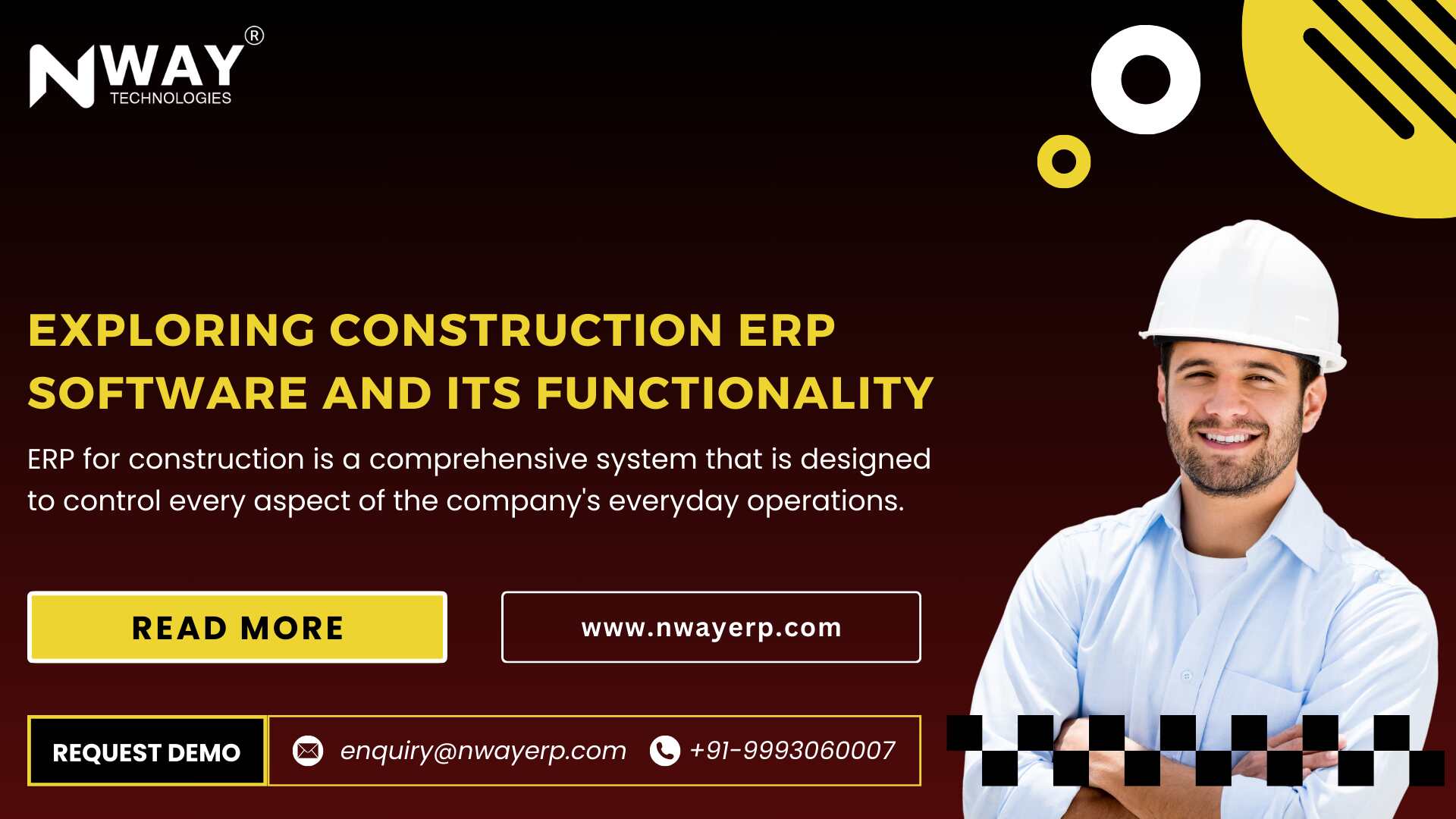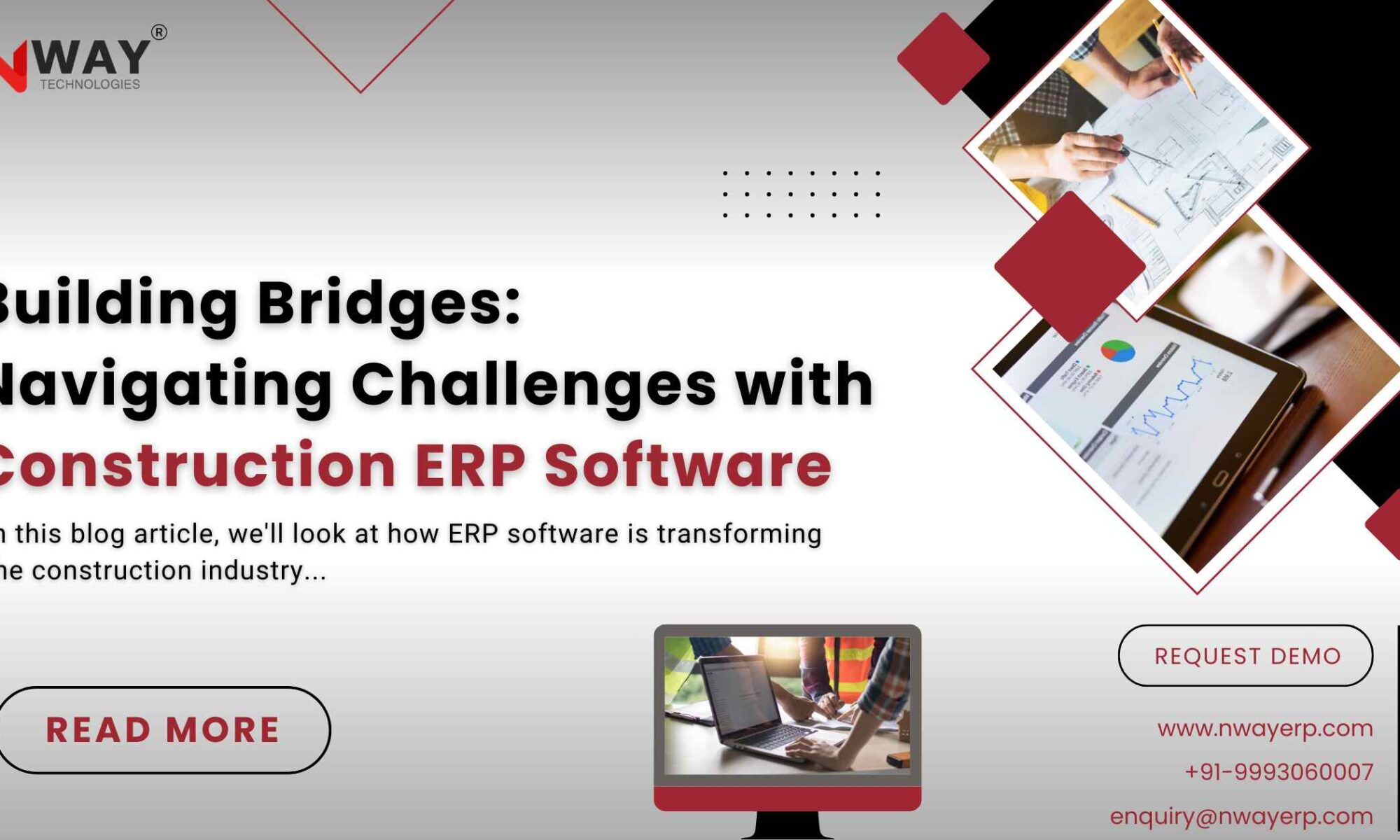Modern Construction management, efficiency, coordination and a seamless workflow are the most important factors. As the construction industry develops as do the equipment and technology which support the operations. One of these tools can be Construction Enterprise Resource Planning (ERP) software. This article delves into the intricacies of Construction ERP Software, uncovering its functions and the advantages it can bring to projects in construction at all sizes.
Understanding Construction ERP Software
ERP for construction is a comprehensive system that is designed to control every aspect of the company’s everyday operations. This specific construction ERP software addresses the specific demands of the construction sector in that it allows subcontractors, contractors and equipment, materials and costs to be controlled efficiently across multiple different projects and sites.
The ERP Construction software comes with options for managing subcontractors and general contractors, finance management as well as payroll and construction accounting, document management as well as service operation within a single database.
After we have figured out the definition of construction ERP Let’s distinguish it from the standard ERP.
What Are The Key Functionality of ERP Construction Software?
Project Management
In the heart of Construction ERP Software lies robust capability to manage projects. From the initial plan to conclusion, ERP software enables users to allocate resources efficiently to track progress, monitor budgets and projects. Project managers can gain instant insight on the progress of projects, providing an active decision-making process and risk management.
Resource Management and Allocation
Achieving effective resource management is crucial to the project’s success. The Construction ERP Software facilitates the allocation of equipment, labor, and other materials to ensure the best utilization of resources. With features like the scheduling of resources and tracking them users can track resource availability, assign tasks and avoid resource conflicts.
Financial Management
The management of finances in the construction industry is difficult due to factors like changing costs, multiple stakeholders, as well as the strict budget restrictions. ERP software can simplify the management of finances through automation of processes like planning, budgeting, invoices and tracking costs. This allows accurate financial forecasting and cost control, as well as complying with regulations.
Document Management
Construction projects create an immense amount of documentation which includes contracts, drawings permits, reports, and other documents. It is a necessity for construction companies to have an ERP Software that provides a centralized storage and organization system for organizing the project’s documents, and allowing access to them. Modern document management tools including the ability to control version and sharing of documents improve collaboration, and make sure that all stakeholders are able to access the most current data.
Collaboration and Communication
Effective collaboration and communication is crucial to the successful completion of projects. The Construction ERP Software facilitates seamless communication with project partners, which includes subcontractors, architects, contractors as well as clients. Communication tools that integrate like project dashboards and messaging platforms help to facilitate collaboration, simplify processes of decision making, and eliminate the bottlenecks in communication.
Analytics and Reporting
Analytics based on data are crucial to improve project performance as well as finding areas of improvement. The Construction ERP Software offers robust reporting and analytics tools, allowing users to create custom reports, monitor KPIs and the performance of their projects. With the help of real-time insights the project team can make well-informed decisions, continue to drive improvements, and produce more efficient results.
What are the Benefits Businesses can Expect with ERP for the Construction Industry?
We will look into the advantages of implementing ERP for construction.
1. Enhanced Internal Communication
Inadequate communication among departments in an organization is usually the main cause of delays in projects. One solution for this is to establish an ERP software. The system could incorporate forum chats on video calendars that are synchronized along with other tools to enhance internal communications within departments.
2. Improved Automation of Operations
The construction industry is usually in a huge size, often spanning several areas and performing many tasks, including managing projects including hiring, purchasing estimates, cost estimation, as well as the customer relationship. They can also be significant in their own right, based on how big the business is.
3. Strategic Decision-Making
Through centralizing processes and data The use of ERP solutions completely transformed this inaccessible environment as well as outdated information as well as sometimes duplicate procedures.
Through removing barriers and delays By removing obstacles and delays, ERP within the construction industry lets managers make informed company-wide decisions easily.
4. Improved Cost and Revenue Estimation
The companies evaluate revenue and cost differently. A lot of companies must submit bids to tender that are selected before they get the project. The client will often take into consideration the cost, plans as well as the credibility of the firm when selecting tender proposals.
ERP software is meticulously analyzing each aspect and provides exact projections of the labor cost as well as raw material expenses as well as project completion dates.
5. Enhanced Marketing Strategies
Implementation of an ERP system for construction firms permits a thorough examination of every aspect of business and metrics that relate to marketing and finance.
By this approach, your marketing strategies can be guaranteed to contain not just effective marketing of your brand however, a range of methods that can be tailored to the audience of your business and needs, such as emails marketing, performance-based marketing, landing page CTAs, as well as lasting marketing.
6. Smooth Data Transfer
Construction industry faces many challenges in the process of organizing the numerous processes that it has and its associated documents. It is becoming increasingly difficult for management to ensure the efficient use of data as organizations increase in size.
Whatever the size of the company regardless of its size, the introduction of the ERP software will make it easier for the database administrator to deal with these issues. In the event of a need, these tools permit secure and efficient transfers of data between departments providing quick access to critical data as well as documents.
7. Enhanced Project Management And Planning
Controlling the process and documentation in the construction industry is a complex task. Supervisors responsible for the efficient distribution of information are faced with a more difficult task in the context of their businesses growing.
However big the company, these challenges can be solved by the implementation of the ERP system that streamlines administration of databases. The ERP systems facilitate the secure and efficient exchange of information between different departments and guaranteeing quick access to critical information and files when needed.
When Should Companies Look Into ERP Software for Construction?
It’s important to consider that a construction business needs to increase its size to a particular degree before deciding to implement an ERP system with a large scale. It is usually about having the ability to pay for first costs of using the program, such as setup as well as training and hosting fees and having an IT infrastructure and personnel ready to implement and manage the software. Costs can be high if you’re not ready for the change.
ERP is fundamentally a strategic instrument designed to help businesses prepare to expand and re-invent themselves, not a single-fits-all approach. ERP decision-making for implementation in construction firms should be taken according to their specific operations’ goals and the size.
Why Choose NWAY Construction ERP Software
NWAY Construction ERP Software stands in the market as a top solution specifically designed for the particular challenges and demands of the construction business. This is why it’s the most preference of many construction firms:
Specific Features for Industry
NWAY Construction ERP Software provides a broad range of tools specifically designed to assist with managing construction projects. From planning for projects to allocating resources, to managing finances and report-writing, NWAY provides tailored solutions to meet the varied requirements of construction-related projects.
Customization and Scalability
NWAY recognizes that each construction project is special. The ERP software is extremely customizable that allows users to adapt the program to suit their particular processes, preferences, as well as project needs.
User-Friendly Interface
NWAY puts a premium on the user experience and ensures that the ERP software it uses is easy to use and easy to use. With its clean and easy-to-use interface, users can swiftly navigate through the software, find pertinent information and complete jobs effortlessly. This improves the user experience and decreases the requirement for education and allows teams in charge of projects to concentrate on their primary tasks.
Integration Capabilities
NWAY Construction ERP Software effortlessly integrates with third-party systems as well as existing software, which allows for the seamless exchange of data and interoperability. It can be integrated with the accounting software, project management tools and IoT gadgets, NWAY ensures that its ERP system is seamless with the technology landscape to maximize efficiency while minimizing interruptions.
Solid Support and Training
NWAY has a commitment to offering exceptional customer service and training support. From onboarding and implementation, to maintenance and ongoing support the team at NWAY are committed to providing an enjoyable and efficient service for their customers. If it’s a case of resolving technical problems or facilitating training sessions or providing guidance on the best techniques, NWAY is there at every stage of the process.
A Proven Track Record
With a demonstrated successful track record and a long list of delighted customers, NWAY Construction ERP Software is an established partner in the construction sector. The solutions it offers have proven to be essential in helping construction companies reduce costs, increase productivity, and ensure successful projects.
Read More : What Does ERP Software Represent in The Construction Industry?
Conclusion
In today’s digitally connected economic environment, all industries need to improve their operation using technology solutions such as ERP. Construction industry is not any different. Additionally, it needs ERP solutions that enable its activities to be efficient, precise, and efficient.
Construction ERP software applications provide proper process management and control of every industrial operation. In addition this ERP aids in making many profits for companies.
It is essential to make a sound decision about whether to subscribe to building ERP software suppliers. In addition to this information and you require any additional assistance in selecting a suitable software option, please feel free to reach us. We’ll be happy to help you to make the most for your company.





